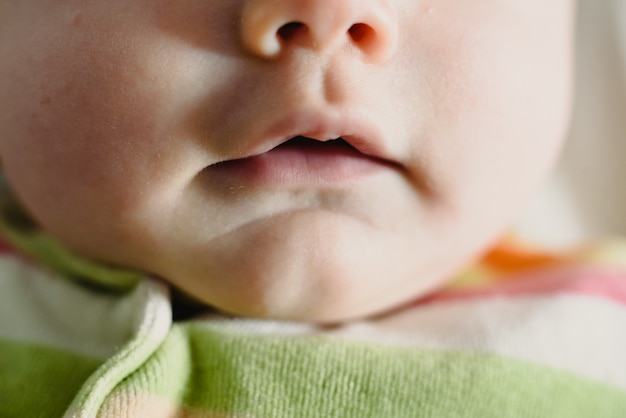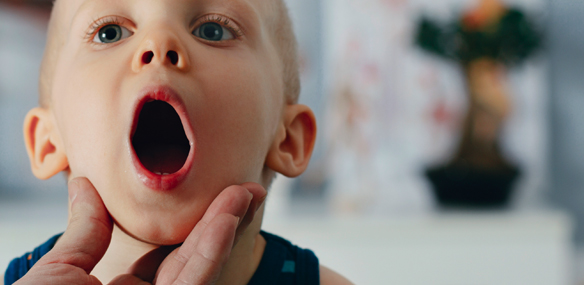Baby Opening And Closing Mouth
Babies are a miracle of life - their cute little fingers, toes, and even their mouth. Have you ever noticed your baby opening and closing their mouth? It's a fascinating sight to see and can make you wonder why they do it. In this blog post, we will explore the topic of baby opening and closing mouth and related keywords, including why babies do it, what to expect, and more.
Pain Points of Baby Opening and Closing Mouth
As a new parent, it can be concerning to see your baby opening and closing their mouth constantly. It's normal to wonder if your baby is hungry or having trouble breathing. Some parents might even worry if their baby is experiencing pain or discomfort. These concerns can be challenging, especially if you're a new parent, but understanding what to expect can help ease your worries.
Why Babies Open and Close Their Mouths
The target of baby opening and closing mouth is to improve their swallowing reflexes. Your baby is working on coordinating their suck, swallow, and breathe reflexes. When a baby sucks, they trigger their swallowing reflex, and this action helps them swallow the milk or formula and keep it down. By opening and closing their mouth, babies learn how to control the movement of their tongue and jaw, which is essential for swallowing and preparing for solid foods.
Summary of Main Points
In summary, baby opening and closing mouth is a normal developmental milestone that is essential for improving their swallowing reflexes. This action helps them learn how to control their movement of the tongue and jaw, which is necessary for swallowing and preparing for solid foods.
Personal Experience with Baby Opening and Closing Mouth
As a parent, seeing my baby open and close their mouth was fascinating to watch. I remember being worried that my baby wasn't getting enough milk or that something was wrong. However, after consulting with my pediatrician, I learned that it's a normal part of baby's developmental milestones. It was a relief to know that everything was okay.

Image source: Freepik
What to Expect with Baby Opening and Closing Mouth
It's normal for babies to open and close their mouth during the first few months of life. However, if your baby continues to do so after 5-6 months, and you notice other symptoms such as difficulty feeding or weight loss, consult your pediatrician. Your doctor might be able to refer you to a speech therapist who can help you address any issues with feeding and swallowing.

Image source: The Health Site
Explaining Baby Opening and Closing Mouth in Detail
When babies first start feeding, they are learning how to coordinate their suck, swallow, and breathe reflexes patterns. They might open their mouth to suck, but then close their mouth to swallow or breathe. Over time, babies learn how to coordinate these reflexes patterns and become more efficient feeders. As they grow and develop, they will swallow less frequently and be able to take in more milk or formula per feeding, eventually leading the way for solid foods.

Video source: Storyblocks
The Importance of Baby Opening and Closing Mouth
Baby opening and closing mouth is an essential part of their development. It helps them learn how to coordinate their suck, swallow, and breathe reflexes patterns. This action also helps them develop their tongue and jaw muscles, which is necessary for feeding and speaking later in life.
Q&A About Baby Opening and Closing Mouth
- Q: How long will my baby keep opening and closing their mouth?
- Q: Can baby opening and closing mouth indicate a problem?
- Q: How can I help my baby improve their feeding skills?
- Q: When can I introduce solid foods to my baby?
A: Baby opening and closing mouth is a normal developmental milestone that lasts for the first few months of life. Around 5-6 months of age, most babies start to coordinate their suck, swallow, and breathe reflexes patterns and become more efficient feeders.
A: It's normal for babies to open and close their mouth during feeding. However, if your baby continues to do so after 5-6 months, consult your pediatrician. They might be able to refer you to a speech therapist who can help you address any feeding or swallowing issues your baby might have.
A: You can encourage your baby to improve their feeding skills by creating a calm and relaxed feeding environment, making sure your baby is properly positioned during feeding, and offering them breaks throughout the feeding.
A: Every baby is different, so consult with your pediatrician before introducing any solid foods to your baby. Most babies are ready for solid foods around 6 months of age when they can sit up independently, have good head control, and show signs of readiness - such as interest in food, the ability to chew, and loss of the tongue-thrust reflex.
Conclusion
Baby opening and closing mouth is a normal developmental milestone that helps improve your baby's feeding and swallowing skills. By understanding what to expect, you can ease any worries you might have as a new parent. As always, consult with your pediatrician if you have any concerns about your baby's development or feeding skills.
Gallery
How To Keep Your Baby’s Mouth Clean - Read Health Related Blogs

Photo Credit by: bing.com / mouth baby open clean keep babies little babys thehealthsite bacteria lurking shutterstock inside also their
Premium Photo | Close-up Of A Baby's Mouth.

Photo Credit by: bing.com /
Baby Opening Her Mouth Stock Image. Image Of Blanket, Girl - 6135667

Photo Credit by: bing.com /
Urgent Care | Sutter Health

Photo Credit by: bing.com / mouth urgent care opening health sutter services baby
Newborn Baby Opens Her Mouth Stock Video Footage - Storyblocks

Photo Credit by: bing.com / newborn